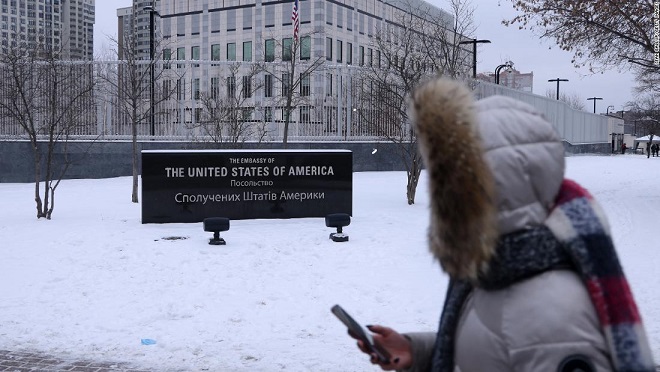Western Evacuation Calls Draw Criticism

VOA News – Jamie Dettmer
Britain joined the United States on Friday in urging foreign nationals to evacuate Ukraine while there are still commercial means to do so. The British Foreign, Commonwealth and Development Office updated its advice shortly after the country’s defense minister, Ben Wallace, flew out of Moscow after talks with senior Kremlin figures.
Estonia is also urging citizens to leave Ukraine immediately due to “an increased risk of military action by Russia.” The evacuation calls came as senior U.S. officials warned that Russia could invade Ukraine at any time and had sufficient forces deployed to do so.
The European Union’s envoy to Ukraine, Matti Maasikas, has urged nonessential staff at its embassy in the Ukrainian capital to leave amid heightening tension with Russia.
“I have urged all expat colleagues with the exception of the essential staff to leave Ukraine ASAP to telework from outside the country,” he wrote in an email message to EU diplomats. “I feel very sad,” he added.
A European Commission spokesperson, however, emphasized that the EU isn’t pulling out all diplomats. “We continue to assess the situation as it develops, in line with the duty of care we have towards our staff and in close consultation and coordination with the EU member states,” said Peter Stano, the foreign affairs spokesman.
The Kremlin denies it has any intentions to invade and is accusing Washington and London of provocative alarmism.
“The hysteria of the White House is more indicative than ever,” said Maria Zakharova, the Russian Foreign Affairs Ministry spokesperson, Friday.
“The Anglo-Saxons need a war. At any cost. Provocations, misinformation and threats are a favorite method of solving their own problems,” she added.
While senior Ukrainian officials acknowledge the threat of a Russian “provocation,” there is deep frustration in Kyiv with the calls for foreign nationals to leave, with concerns mounting that the message is demoralizing for Ukrainians and at this stage premature. Ukraine has frequently played down warnings from the United States, and Ukrainian officials say they are seeing “nothing new” in Russian military activity now.
The secretary of Ukraine’s National Security and Defense Council, Oleksiy Danilov, said Ukrainian authorities are “well aware” of the possible provocations Russia could stage. “We are currently considering all options,” he added.
Ukraine says it is giving Russia 48 hours to explain the presence of its troops at the border under the terms of the Vienna Document, a series of agreements on European security. But Dmytro Kuleba, Ukrainian foreign minister, said the statement is “not evidence of some radical change of the situation.”
Japan, Australia, New Zealand and the Netherlands have also asked their citizens in Ukraine to leave.
British diplomats say a meeting Friday between the heads of government and ministers of NATO members was sobering. “Next week is the working assumption,” a senior British official said. During the meeting U.S. President Joe Biden was clear an invasion was imminent, he added.
British Prime Minister Boris Johnson told the meeting “he feared for the security of Europe in the current circumstances,” Downing Street said in a statement.
“He impressed the need for NATO allies to make it absolutely clear that there will be a heavy package of economic sanctions ready to go should Russia make the devastating and destructive decision to invade Ukraine,” the statement continued.
Some British lawmakers added their concerns to Ukrainian worries that the calls for departures and evacuations were sending the wrong signals to Moscow and suggest the West is giving up on Ukraine. Tobias Ellwood, a Conservative member of Parliament and chair of the House of Commons Defence Committee, said the rhetoric being used by Washington and London appears to be “bordering on panic.”
Ellwood conceded the governments have a duty of care for their citizens, particularly when the threat picture changes.
“But it’s almost bordering on panic and that absolutely fits into [Russian President Vladimir] Putin’s objective. He’ll be delighted to see the West and the NATO alliance crumbling in this way.”
Ellwood has been advocating for a serious NATO force to be deployed in Ukraine for weeks, arguing that would be the only way to deter Russia. “The least we can do now is provide a no-fly zone,” he added.
Ukraine’s envoy in London has also been arguing for NATO deployments. Britain should send troops to Ukraine to deter an invasion, Vadym Prystaiko told The Times of London.
Most of the thousands of Britons and Americans in Ukraine have deep roots there. Many have dual nationality, strong family ties and are married to Ukrainians and are unlikely to leave. U.S. Embassy staff have been telephoning American nationals in Ukraine urging them to evacuate.
Biden has announced military plans to fly American troops into Poland to help with any evacuations, hoping to avoid the chaos seen during the August U.S. evacuation from Afghanistan. Britain is also drafting evacuation plans. Like the Americans, Britain is planning to evacuate more Kyiv-based diplomats and to relocate them to Poland, British officials say.
“The aim is to strip down to the bare bones,” an official told VOA.